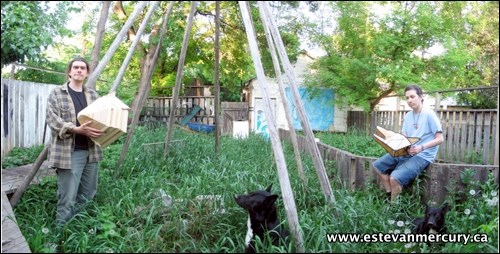Estevan's Art Gallery and Museum offers residents a creative outlet; somewhere for one to escape amongst the world of self-interpretation.Griffith Baker, director/curator for the Estevan Art Gallery and Museum, jumped on board in the early months of 2009. His first exhibition featured artists who were very dear to him personally, but talented nonetheless. "They had a second grant available to do some sort of special project. Our previous curator, Cheryl Andrist, applied for this grant, which they call the special initiatives grant, and received somewhere in the vicinity of $7,000 to curate an exhibition with a guest curator. "Cheryl retired a few months later and I came in, and having a different set of skills than Cheryl, I chose to redistribute the money towards a catalogue and having an exhibition," said Baker.The exhibition promoted First Nations' masterpieces, which were collaborated by Sean Woodroof Wally, Baker's former professor at the University of Regina, and John Henry Fineday, a friend of Baker's who attended the same university. "I thought what better than to have a perfect collaboration between a First Nations artist and a European artist. Not only that, but John Henry is from the West Coast and Sean is from the East, so I thought that was kind of interesting geographically since they are talking about the same sort of ideas," said Baker. The ideas Baker describes are that of eco-tourism, manmade attractions like campgrounds, ski hills, etc., and environmentalism. Both Wally and Henry created pieces of art, which stemmed from ancient Cree legends, mixed with their views on the afore-mentioned themes, out of rawhide and wood."John did the rawhide stuff and Sean did the wood stuff. They combined it so that before John did one of his rawhide pieces, Sean would do his wood piece so it would incorporate. They weren't working separately, they were always working together."Having two artists work on one sculpture, something that is completely collaborative from start to finish; there is some really neat works that come out of it," said Baker of the pair's unique collaboration. Sadly, before the exhibition was to take place, Henry passed away. The work featured was his last masterpieces. "John passed away from leukemia, so this exhibition was actually the last bits of sculptures that he ever made. In fact, a lot of them were being made on his death bed, I mean, that's how dedicated he was to art."However, Baker said people often assume that First Nations art is ancient, but that wasn't the case in last year's exhibit. "For his specific exhibition, because it is a First Nations' artist and First Nations contemporary art, which is kind of a strange thing because when you think of First Nations' art, you think of soap carvings or something like Lonechild's work where it's always colourful and always influenced by coyotes or eagles. "This is a little different. It is influenced by legend but it is contemporary and not very traditional in a sense," said Baker. Contemporary is another one of art's aspects that is often misconstrued and misunderstood. "I think we are being detached from it and, in a way, I think it's the way the art world has gone. It's kind of become inaccessible because it's really high academic, hard to understand, there's some weird stuff and it's not always visual," said Baker. However for a community that may not be bombarded with new forms of art, Baker said the community is catching on. "Our community is so transient. We have people from all over the world coming here on a regular basis."




